Now that AI has been mainstream for over two years, you may be wondering: How is artificial intelligence changing sales? I’m here to give you the lowdown on how sales teams are using AI, how it has changed the sales landscape, and how you can use AI in sales, too.
I have mixed feelings about AI — I think it’s equal parts exciting and alarming — and I know many others do, too. But regardless of whether you feel AI is good for sales, your role, or humanity at large, the fact remains: It’s only getting more sophisticated and ubiquitous as time goes on.
So, it serves you, whether you’re a sales rep or leader, to understand how to leverage artificial intelligence in sales. That’s why I’ve compiled this handy guide to help you out on that front. Let’s dive in.
Free Download: Sales Plan Template
Table of Contents
- What is AI in sales?
- The Need for Artificial Intelligence in Sales
- The Benefits of Artificial Intelligence and Automation in Sales
- 11 Ways Your Team Can Use AI in Sales
I’ll preface this whole piece by saying that I’m extremely wary of AI.
Ever since the first time it had the audacity to autocorrect one of my texts, I’ve been convinced that it’s going to lead to mass professional displacement and/or humanity’s downfall — but until those things happen, I’ll try to be objective about its benefits and pitfalls.
Frankly, it has plenty of both for salespeople. Let’s take a look at some of them.
AI is further empowering buyers.
We’ve been living in the era of the empowered buyer for quite some time now. Prospects are as well-informed, confident, and independent as they’ve ever been — and AI is only expediting that trend.
Self-service resources for product research (most notably search engines) are already a staple of the modern buyer’s journey, but generative AI is becoming an increasingly prominent resource, shaping how consumers understand the products and services they invest in. Here’s how I see it changing the buyer and seller experience:
- Google is in the process of augmenting its search results with generative AI. This means more people will find the answers to their searches in AI responses.
- AI chatbots are growing in popularity with younger generations for consumer queries. In HubSpot’s State of Consumer Trends Report, 13% of Gen Z respondents cited it as their preferred method for finding answers to their questions online, compared to just 2% of Boomers.
- As AI’s popularity as a resource for product research grows, I think it could potentially undermine the salesperson’s traditional position as the more informed, consultative guide in a sales engagement.
As a salesperson, this shift could be helpful or frustrating, depending on how that research casts your offering. A prospect’s AI-powered research might frame your product or service in a positive light — immediately establishing it as a good fit for a prospect and offering you a leg up. Or AI’s take on your offering might be less than flattering, forcing you to sell from a more compromised position.
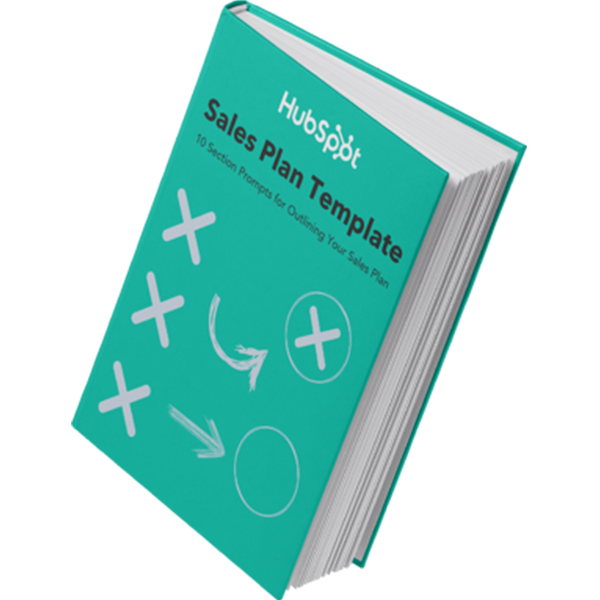
Free Sales Plan Template
Outline your company's sales strategy in one simple, coherent sales plan.
- Target Market
- Prospecting Strategy
- Budget
- Goals
Download Free
All fields are required.

Salespeople are concerned about job displacement.
Beyond empowering buyers, AI’s emergence has some wide-reaching implications in sales — some of which can be unnerving. I touched on this at the beginning of this section (a bit tongue-in-cheekily), but AI has led to some real concerns about job displacement in the field.
That trend isn’t exactly specific to sales, but it still has a lot of sales professionals particularly worried. Our 2024 State of AI in Sales survey found that 59% of sales professionals are concerned about AI replacing their jobs in the next few years.
AI can free up salespeople to sell more effectively.
But even with job displacement fears looming, several salespeople still see AI as an invaluable resource in the modern sales landscape — one that supports their professional responsibilities as opposed to undermining them.
That same survey found that 78% of sales professionals believe AI can help them spend more time on the most critical aspects of their role, and 74% agree that AI can help them spend more time on the parts of the job they enjoy most. We also found that 43% of sales reps are now using AI in their jobs (up from 24% in 2023), but sales is still lagging in adoption behind other sectors (consider marketing at 74%).
I think there’s a growing need for salespeople to understand and adopt AI-related resources — let’s take a closer look at the “why” behind it.
The Need for Artificial Intelligence in Sales
Regardless of how you might feel about AI, the fact remains: AI is not going to un-invent itself. It’s already a staple of several fields — especially sales — and its role is only going to grow.
The way I see it, adopting AI-powered resources has transitioned from a nice-to-have to a need-to-have in sales. Our 2024 State of AI in Sales survey found that 76% of sales professionals predicted that most of the software they use will have built-in AI capabilities by 2030.
Notably, 87% say they’ve started using AI because it’s integrated with tools they already use, like the AI in HubSpot’s Sales Hub. This has led to better data analysis, forecasting, and overall sales efficiency.
While being extremely wary of AI, I’ve caved to using it — not because I wanted to, but because I came to understand that my position wasn’t practical. And a lot of salespeople are hitting that point as well.
AI is here to stay, and refusing to adopt it means you run the risk of being left behind. It serves everyone, from BDRs to CSOs, to start taking AI seriously and learning to leverage it, both individually and organizationally.
The “need for artificial intelligence” in sales boils down to this: not letting stubbornness interfere with organizational efficiency and effectiveness. I’ve come to the conclusion that there’s no real reason to avoid embracing AI in sales.
The Benefits of Artificial Intelligence and Automation in Sales
I’ve come to see that AI does actually offer some very real benefits in sales — and salespeople generally recognize those.
Overall, our 2024 State of AI in Sales survey revealed that AI offers time-saving capabilities, deeper data analysis, and stronger forecasting potential. Here are some other findings and the figures to support them.
AI can help automate tedious tasks to free salespeople up to sell.
- The number one use of AI is to automate manual processes, such as manual data or information entry.
- 64% of sales professionals save one to five hours per week using AI to automate manual tasks.
- 78% say that AI can help them spend more time on the most critical aspects of their role.
- 73% state that AI tools have increased their team’s productivity.
AI can support more thoughtful customer insight.
- 73% of sales professionals agree that AI can help them pull insights from data they otherwise wouldn’t be able to find.
- 65% say AI will help them understand their customers better.
- 52% use AI for data analysis, lead scoring, pipeline analysis, and forecasting.
AI can enhance personalization in sales.
- 69% of sales professionals strongly or somewhat agree that AI can help them personalize the customer experience.
- 61% also agree that AI can make prospecting more personalized.
- 22% actively use AI to personalize their outreach.
- 70% say that using AI increases their response rates.
Obviously, that list of benefits isn’t exhaustive, but you get the idea. AI expedites aspects of sales that many salespeople often find tedious or challenging. It helps structure better-informed, more streamlined sales efforts — even if its presence presents some reasonable, serious concerns.

Free Sales Plan Template
Outline your company's sales strategy in one simple, coherent sales plan.
- Target Market
- Prospecting Strategy
- Budget
- Goals
Download Free
All fields are required.

11 Ways Your Team Can Use AI in Sales
Artificial intelligence in sales can be leveraged in many different ways. However, here are 11 applications that I think can transform your sales process.
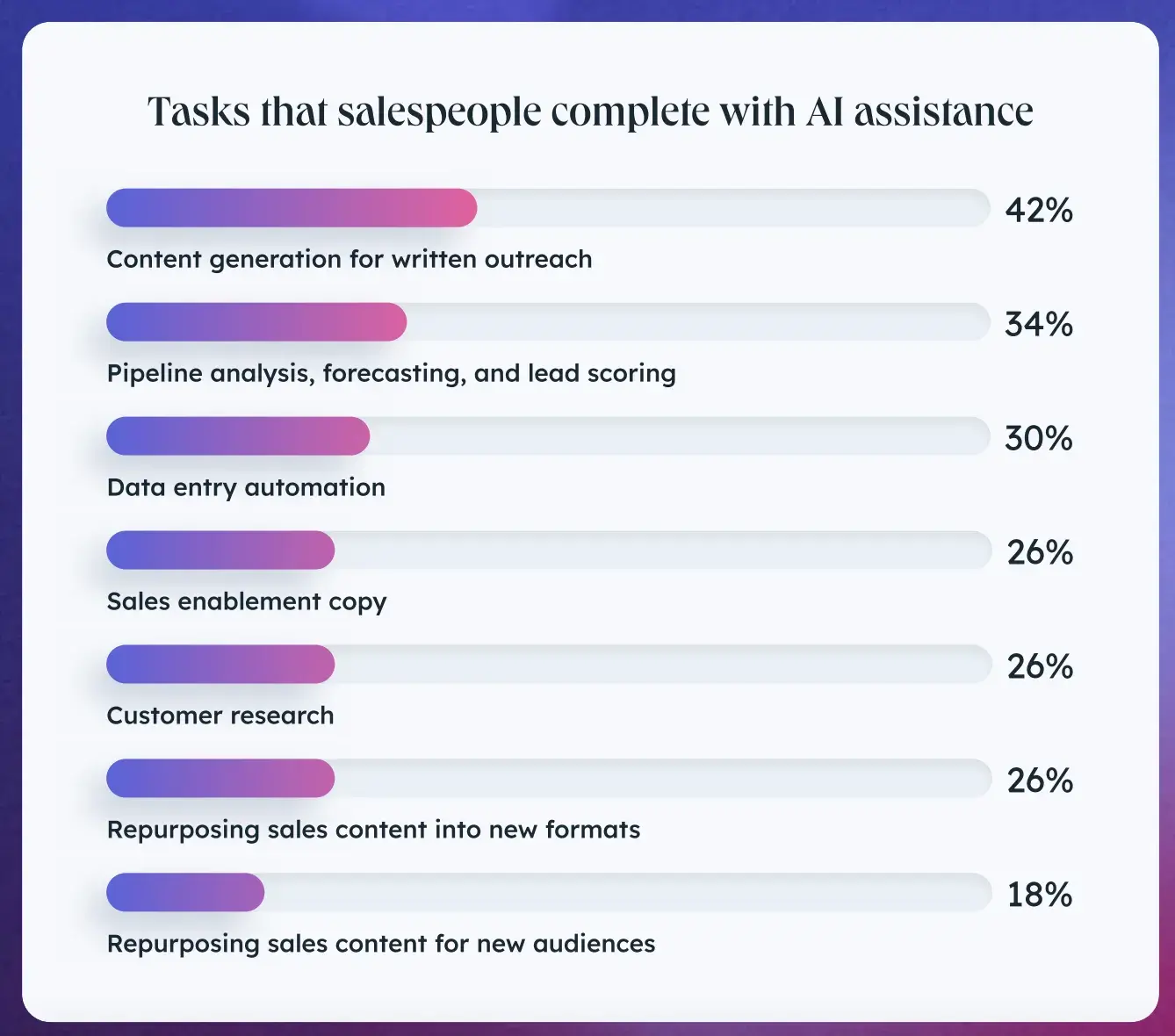
1. Access to advanced data enrichment, analysis, and applications.
Sound data enrichment — the process of pulling data into an organization’s database (typically a CRM) from third-party sources — is transitioning from an asset to a necessity for sales orgs. It allows you to create a more holistic, comprehensive, and accurate understanding of your prospects, leads, customers, and processes.
HubSpot’s Sales Hub is a robust customer relationship management (CRM) tool for salespeople and sales teams. I love how this platform offers a comprehensive solution. From forecasting to prospecting and even scheduling meetings, I guarantee you’ll find ways to improve your workflow.
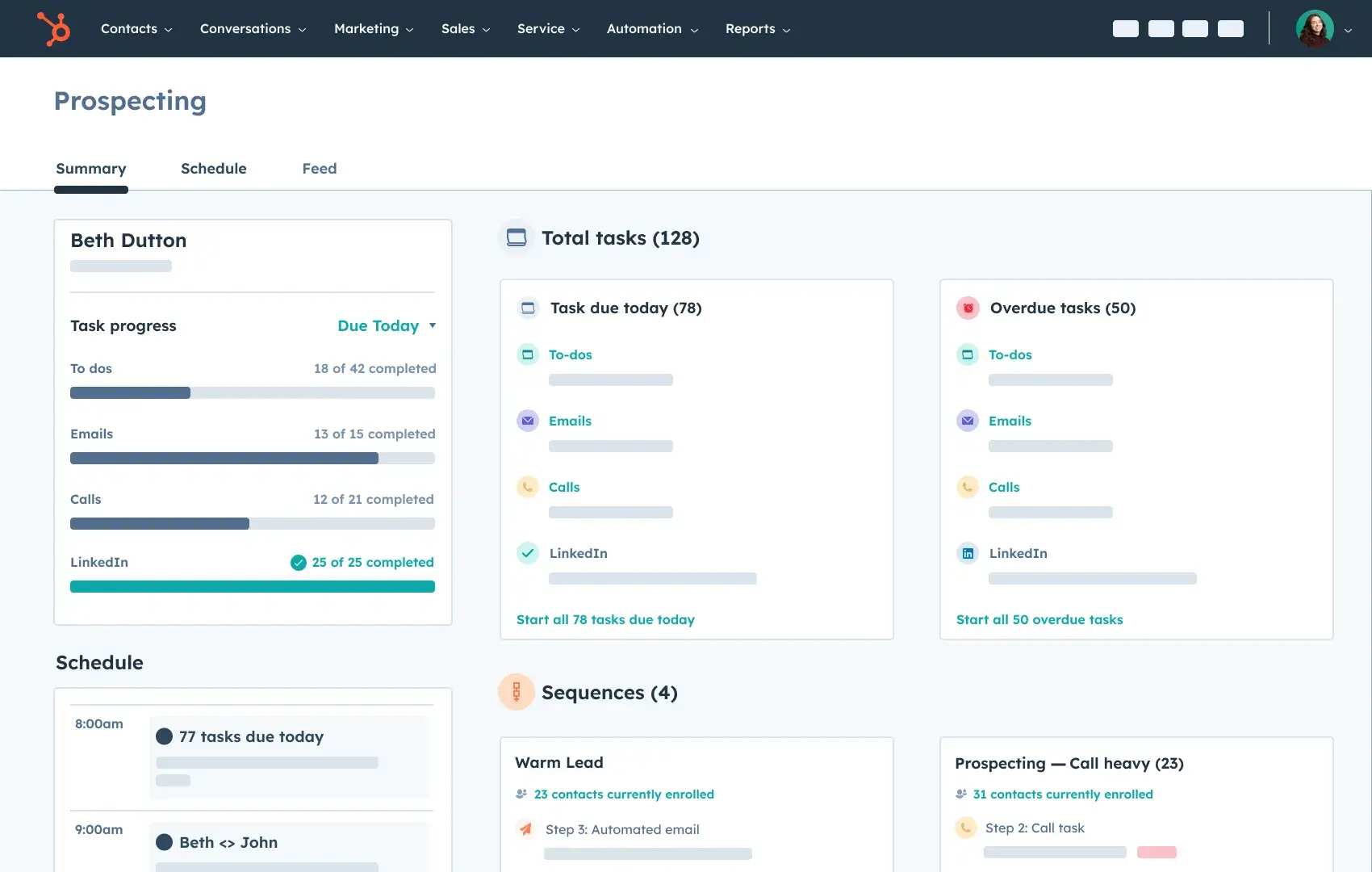
Get started with Sales Hub today.
Sales Hub also leverages artificial intelligence to gather data from your prospects and customers.
Key features include:
- Data capture through the mobile business card scanner. This uses machine learning to pull contact data directly into your CRM from a business card.
- Data enrichment. AI automatically populates your CRM by pulling contact properties from email conversations with prospects, leads, or customers. This data could be phone numbers, geographical locations, job titles, and more.
Another interesting application of AI in data enrichment is Zoho’s DataPrep solution, which analyzes and transforms data into new “types.”
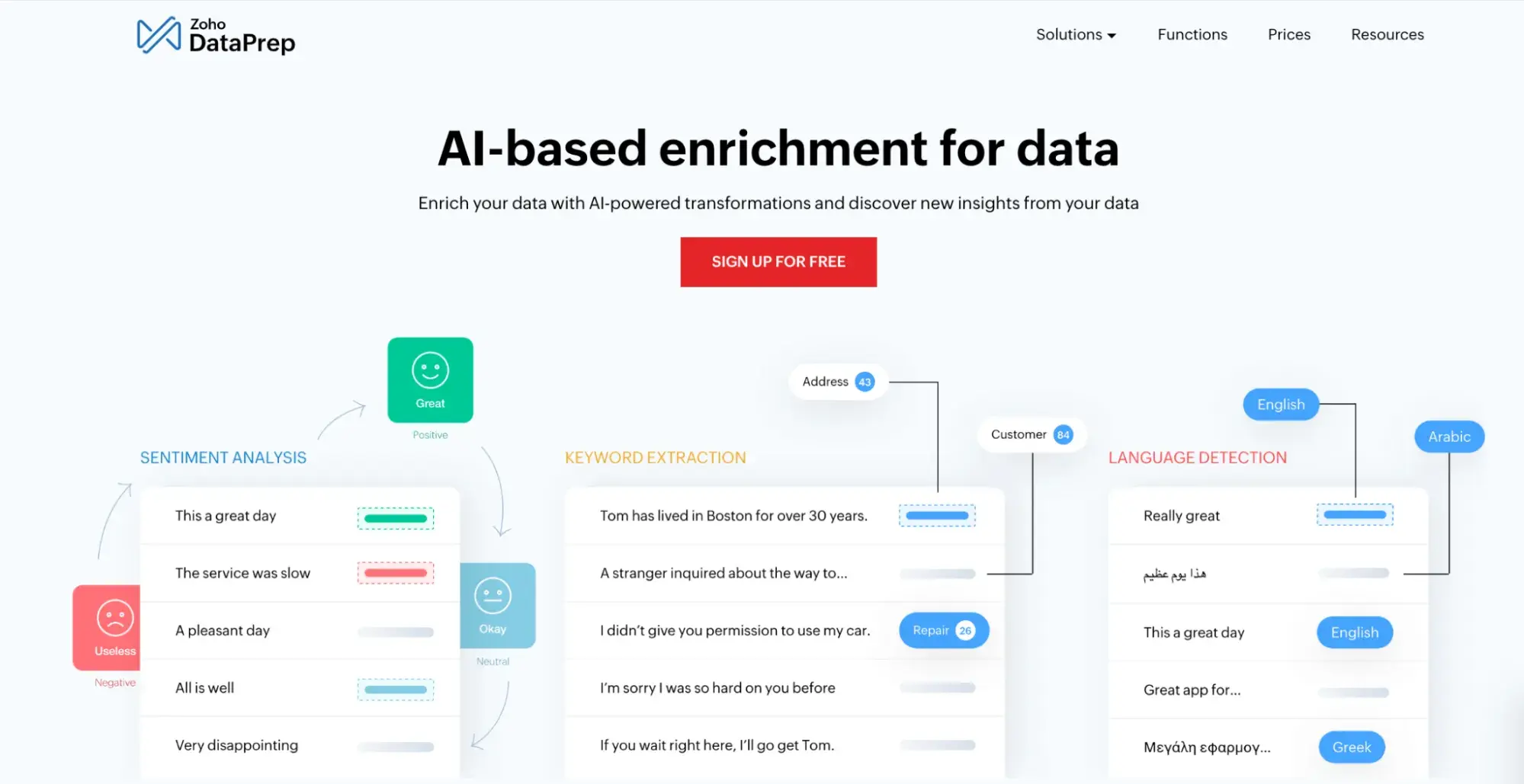
Zoho uses AI to extract “meaning” from existing information in a CRM and uses its findings to create new data points, such as lead sentiments and topics of interest. These “new” data points can then be leveraged across several use cases. That includes lead scoring, lead prioritization, and outreach personalization.
2. Summarize meetings and calls with conversation intelligence.
Salespeople spend lots of time in meetings and on calls with prospects and customers. These are the most valuable touchpoints because you’re in live contact with your clients. After each call, it’s crucial to summarize what was discussed and highlight action items.
AI can now do that for you — with a high degree of accuracy.
Most sophisticated conversation intelligence software leverage some form of artificial intelligence to analyze sales calls and pull key insights.
A great example of one of these tools is HubSpot’s conversation intelligence solution. This platform uses AI to “uncover the why behind sales performance.”
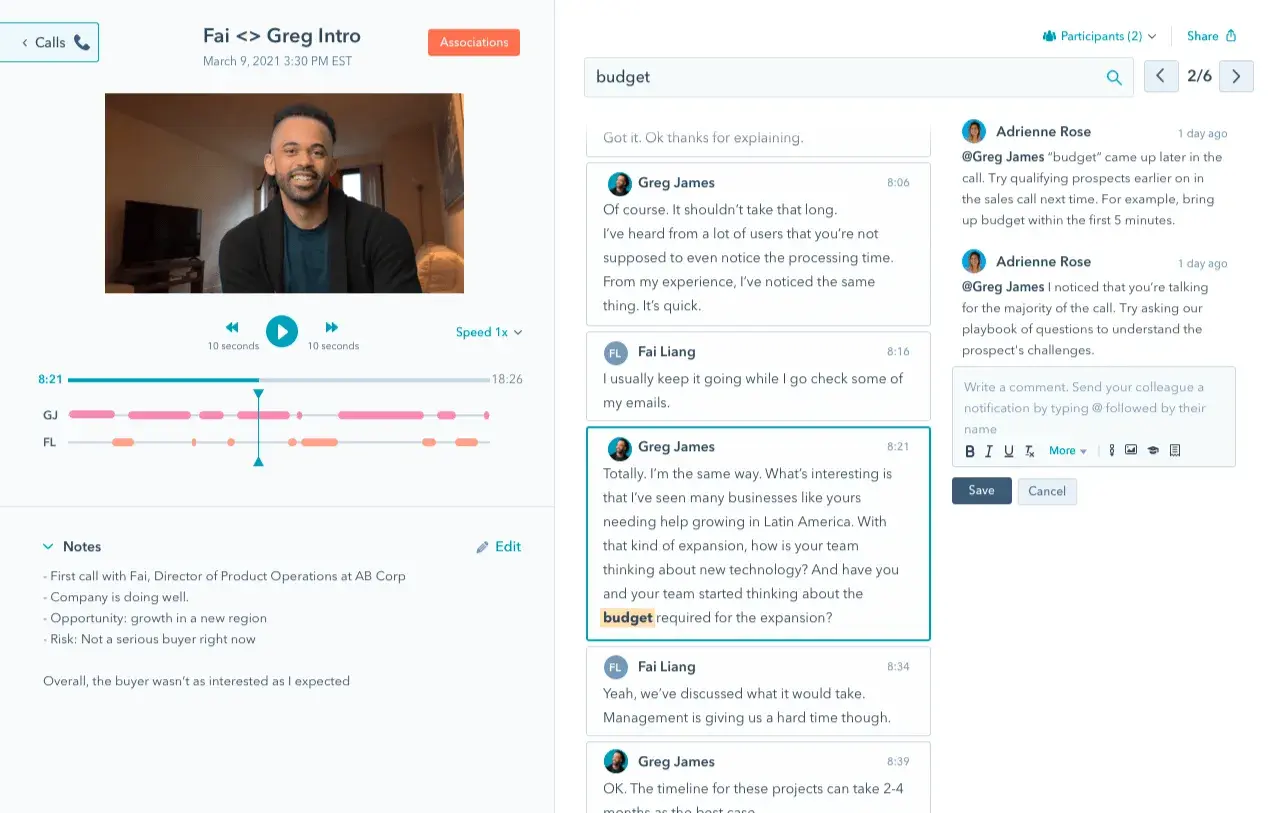
The program identifies key insights, such as trends and objections. This data can then be used to easily pinpoint areas of weakness or underperformance.
Another example of an AI-powered conversation intelligence tool is Chorus. This platform leverages artificial intelligence to recognize the context within a conversation, identify key moments within sales calls, and even note competitor mentions.
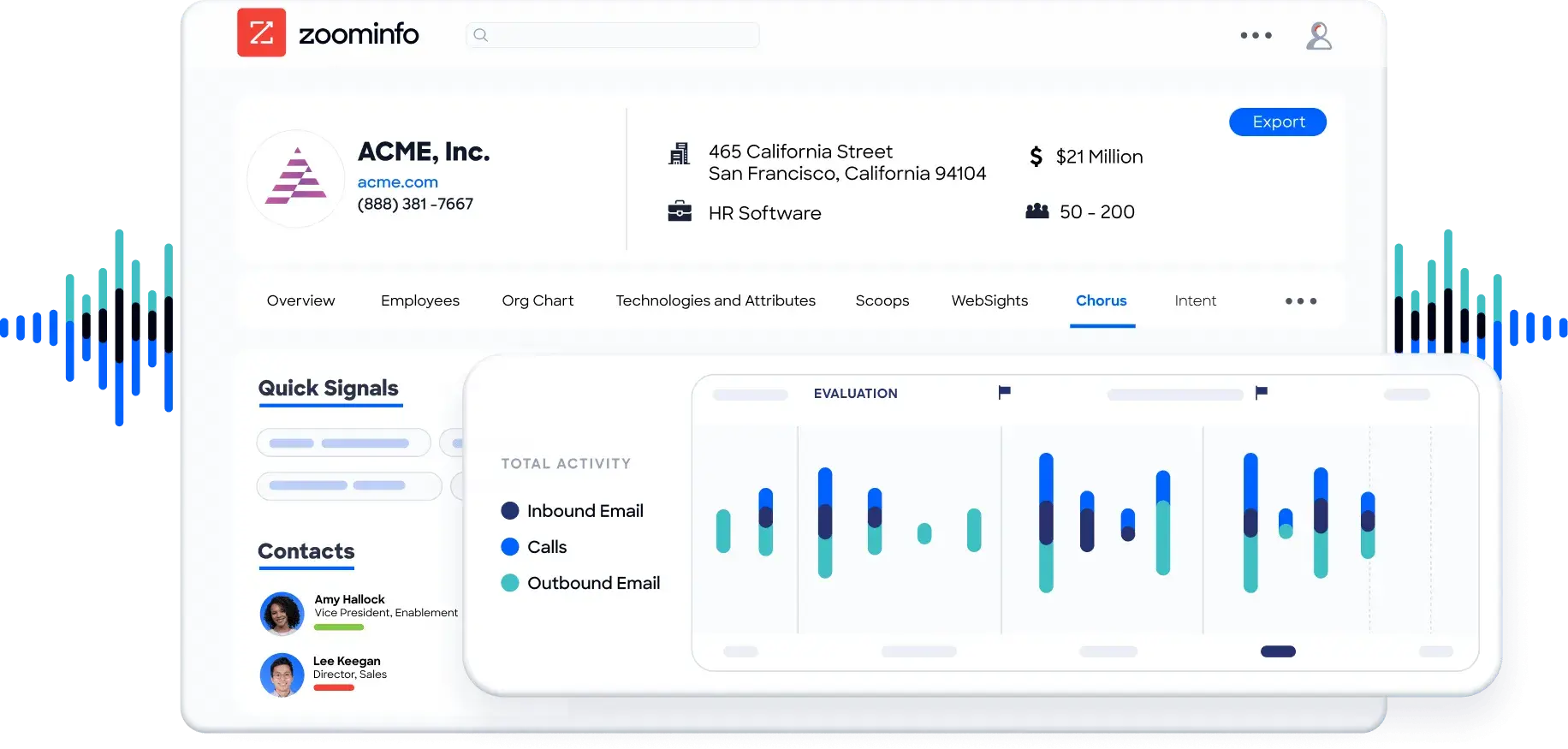
3. Improve pipeline management and forecasting.
Although most sales reps follow best practices and periodically run sales forecasts, recent data has found that the majority of sales reps inaccurately forecast their pipeline. However, leveraging artificial intelligence allows you to significantly reduce the probability of inaccuracies in your sales team.
Consider Aviso, an AI-driven forecasting solution, to understand how this works.
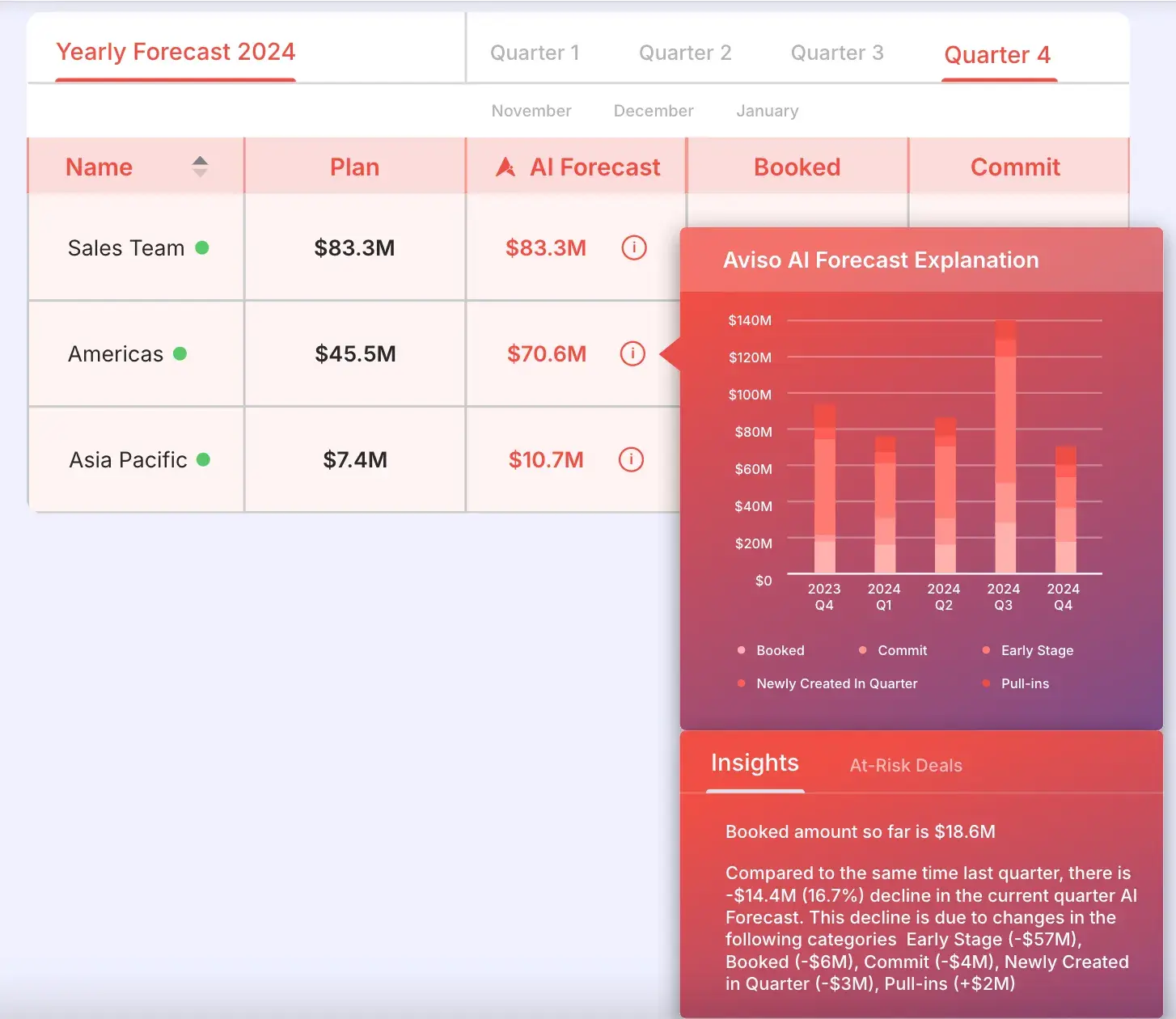
Aviso uses AI to analyze data and produce insights into deals and the overall pipeline. Some of these AI applications include:
- WinScore Insights. This is a score that represents the likelihood of successfully closing a deal.
- AI-powered forecasts. This can be used to predict the total number of new deals, renewals, and churn within a fixed period.
- Scenario forecasting. These dynamic forecasts take “what if” scenarios into account.
- AI-powered suggestions. These insights account for historical and current performance.
I think these AI-powered features can be the key differentiator in how well a sales team can build forecasts, draw insights from these forecasts, and make decisions.
4. Create and repurpose sales content.
Generative AI can be super helpful in creating and recycling sales content for a different purpose, a new audience, or a different format. We found that 47% of respondents use generative AI tools such as ChatGPT, Jasper, and DALL-E to help write sales content or prospect outreach messages. Check out these prompts if you’re interested in exploring this use case.
HubSpot offers a generative AI tool that can help write, expand, or change the tone of your copy across your sales materials.
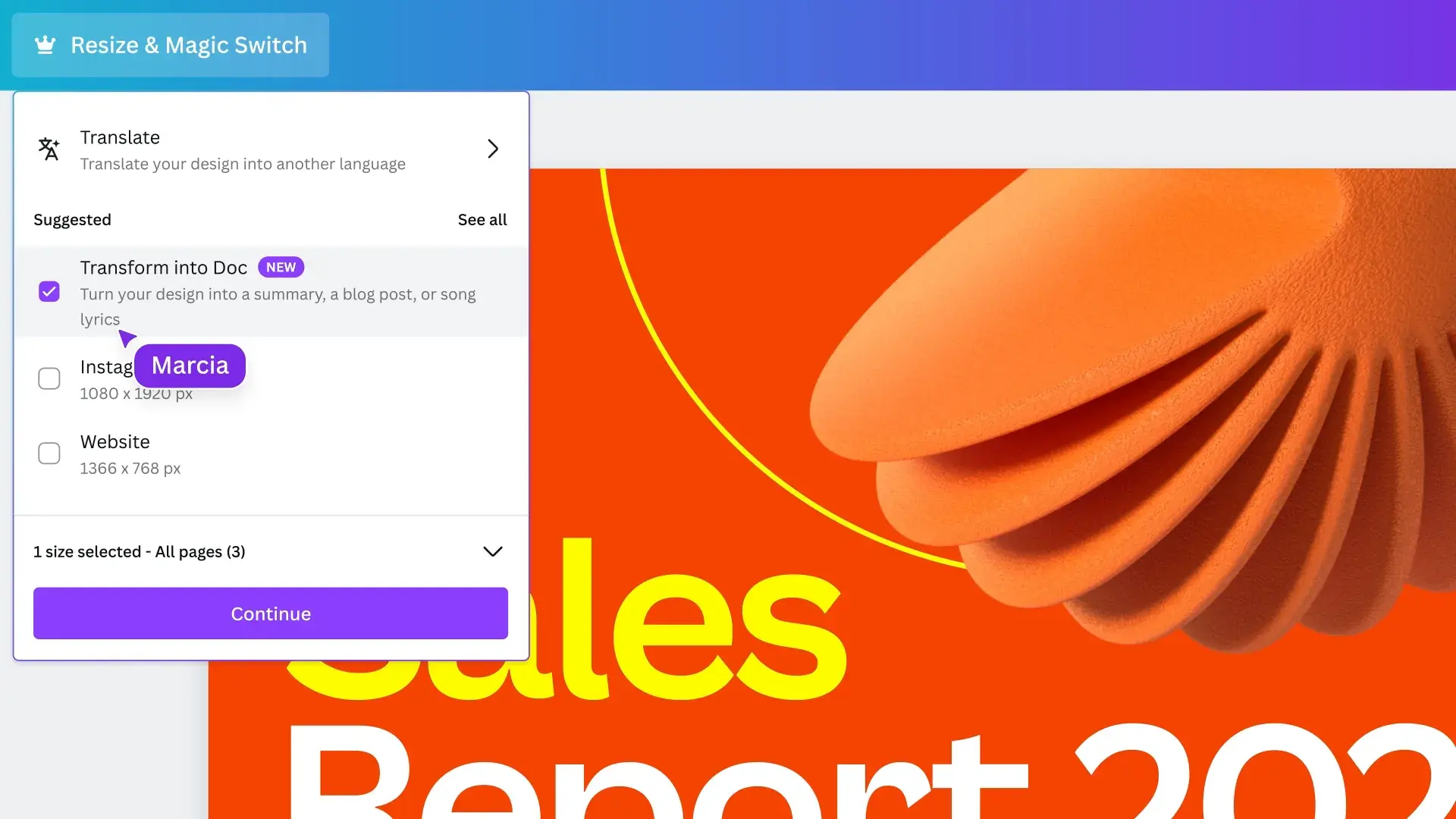
Another helpful toolkit is Canva’s Magic Studio. It uses AI to help you in the content creation process, from writing to design. One tool I think is especially relevant here is Magic Switch, which can repurpose your content in seconds, whether you need a different format or to share content with a different prospect.
5. Recommend next steps for sales reps with AI-guided selling.
AI can help find and recommend the next best action for sales reps to take with every prospect in their pipeline. Instead of having to keep track of each relationship and every move each prospect makes, AI can take care of that for you. It can nudge you when it sees a prospect is ready for the next step or prompt you to reach out if a prospect is getting cold.
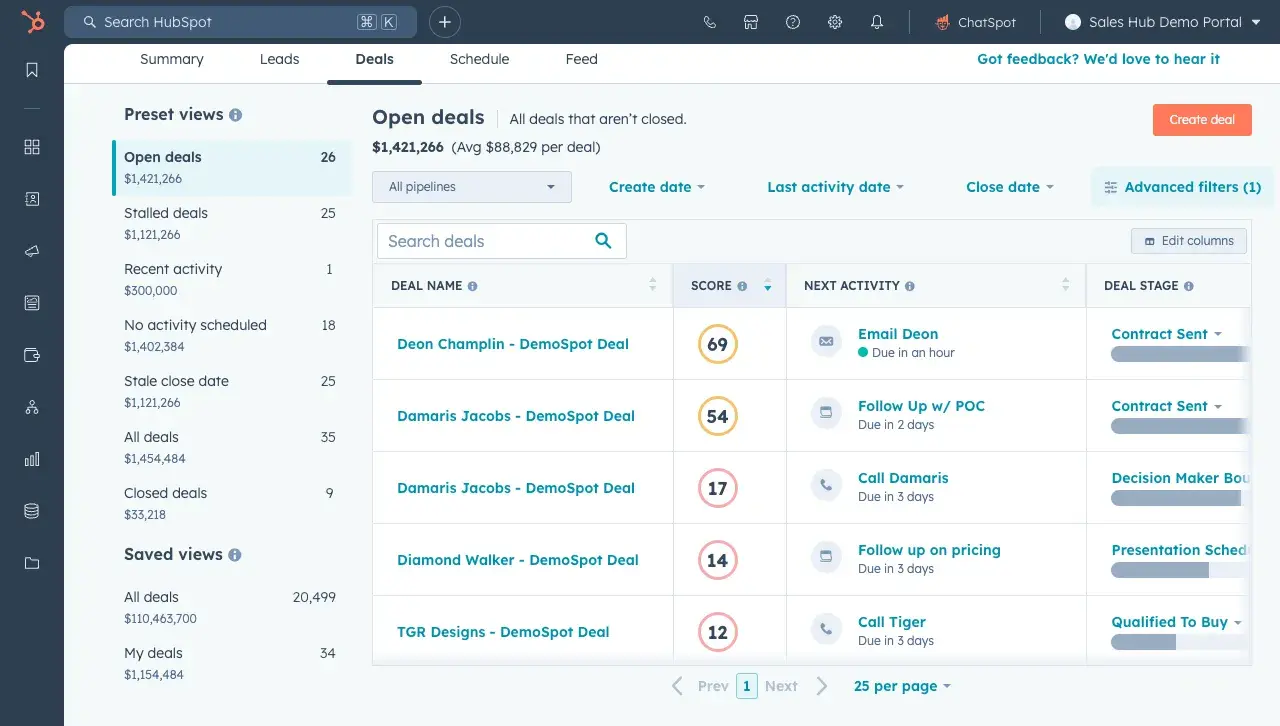
HubSpot’s AI-guided selling software helps you work with the right leads on the right deals at the right time. It helps you prioritize which actions to take with which prospects.
I find it helps sales reps take impactful actions and increases their overall efficiency.
6. Monitor your competitors.
Stop monitoring your competitors manually and set AI to keep an eye on them. It can scrape competitor websites, social media, and news sites for pricing, announcements, new offerings, marketing campaigns, and performance. It will then notify you with relevant updates and provide analyses on how they’re performing.
You will be able to identify emerging trends faster and make strategic decisions sooner. In other words, you’ll have an edge over your competitors with the real-time data AI can provide 24/7.
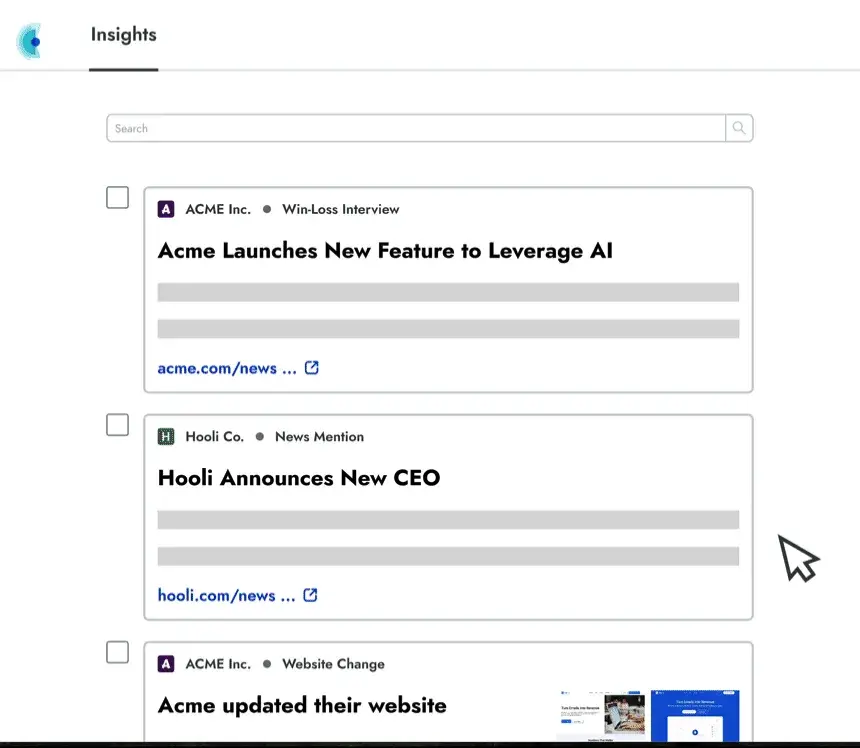
Crayon, for example, uses AI to summarize any news about your competitors and analyzes changes in your competitive landscape with scores to help you know which are the most important — all delivered to your inbox daily.

Free Sales Plan Template
Outline your company's sales strategy in one simple, coherent sales plan.
- Target Market
- Prospecting Strategy
- Budget
- Goals
Download Free
All fields are required.

7. Enhance lead scoring and qualification.
Knowing which leads are more likely to buy and which prospects fit within your target audience is key to successful selling. In my experience, there’s no point wasting time on leads who are not ready or likely to buy.
This is why lead scoring and qualification are essential tasks — made a thousand times easier (and more accurate) with the help of AI. For instance, HubSpot offers a predictive lead scoring tool that uses artificial intelligence to identify high-quality leads based on predefined criteria and the historical data of clients who’ve closed.
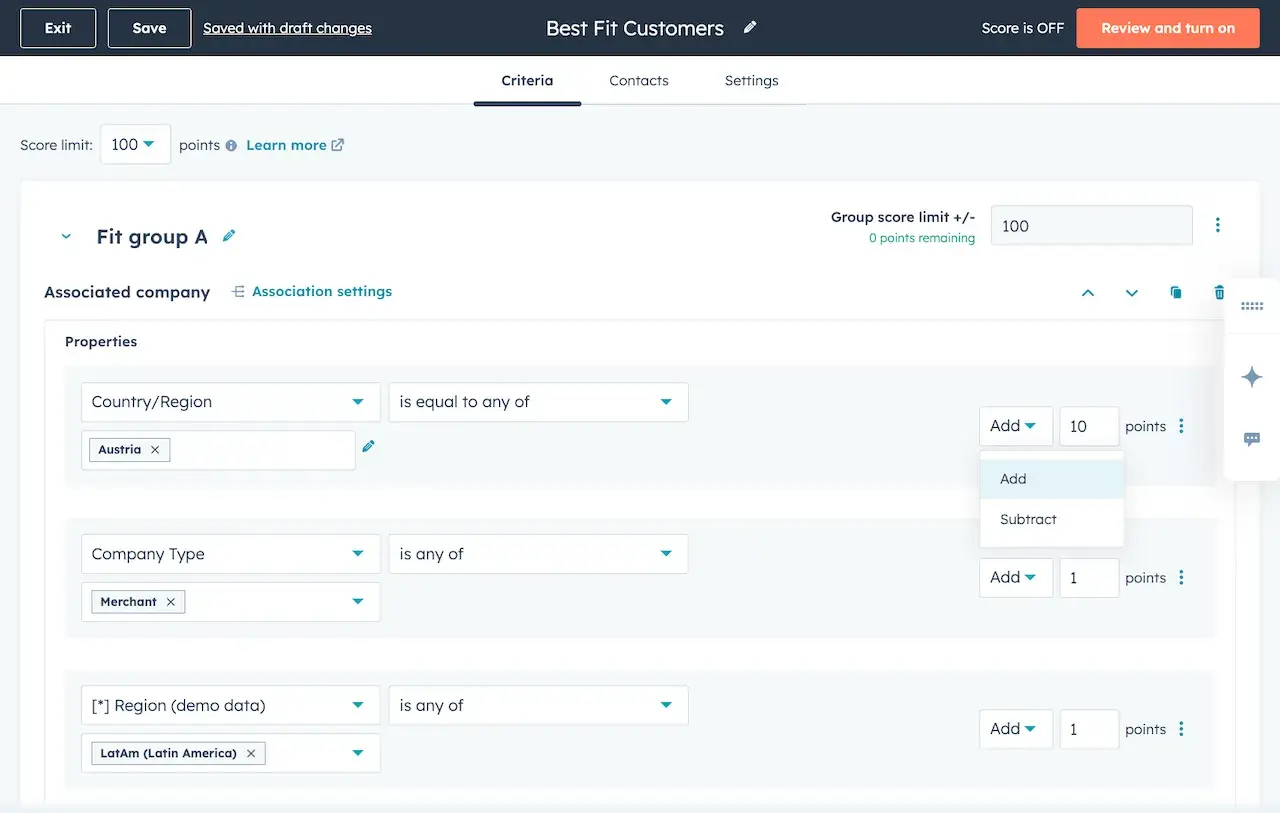
Its AI-guided predictive lead scoring will help you identify and prioritize the best leads through customized scoring metrics based on real-time data. It provides scores based on fit and engagement so you know if they fit your ideal customer profile (ICP) and how much interest they have in your offering.
8. Streamline and optimize sales engagement.
Sales engagement consists of all buyer-seller interactions within the sales process — from initial outreach to customer onboarding. AI can help you leverage data and insights to streamline this process by helping you understand customer needs and pain points.
The top use case for AI in sales is to help representatives understand customer needs, according to Salesforce’s State of Sales report. Your knowledge of each customer’s needs informs every decision you make in customer interactions — from your pitch to your sales content and overall outreach approach.
While consumers can use AI to research potential solutions and companies, sellers have the same power in their hands and can use AI to research prospects who fit their ICP so their initial outreach lands well.
Moreover, you can streamline sales engagement with automation. Most customers follow a similar path with your company, so not every interaction needs to be re-invented each time. I’ve found leveraging automation for customer interaction is a fantastic way to keep customers engaged while saving reps time. And don’t worry. You can automate the personalization as well so customers don’t feel like they’re at the receiving end of rote communication.
A great example of a sales engagement solution that helps you do this is Apollo. By leveraging AI on Apollo or exploring similar alternatives, you can:
- Set up automated outreach messages using pre-defined customization fields.
- Optimize the performance of your outreach by running A/B tests.
- Access AI insights on your outreach campaigns, such as a prospect or lead’s interest level.
- Leverage the “rules engine” to update pre-determined sequences or outreach campaigns once certain criteria are met.
9. Personalize pitches and emails.
Generative AI has become extremely (or unsettlingly) sophisticated and is particularly great with personalizing customer interactions. I think it can be especially helpful in personalizing pitches and emails. I spoke with two experts who shared their personalization use cases.
Gregory Rozdeba, CEO of Dundas Life, claims that leveraging generative AI in InsurTech has been pivotal. Rozdeba notes that the team uses AI to personalize sales pitches and proposals, making every interaction with prospects feel tailor-made.
“By analyzing data on customer preferences and behaviors, AI helps us predict needs, enabling preemptive solution offerings. This not only increases engagement but also positions us as attentive and proactive. Moreover, AI-driven insights into market trends ensure our strategies remain agile, keeping us ahead in a competitive landscape,” Rozdeba says.
Generative AI’s ability to support personalization extends beyond personalizing pitches — it can also assist with email outreach.
Pat Schirripa, CEO of People 2U, says, “Forget robots taking sales rep jobs! Generative AI is a game-changer for our team. We use it to craft personalized email outreach that grabs attention.”
Schirripa shares that AI analyzes customer data and suggests email content tailored to each lead’s needs. That saves reps tons of time with personalized messages, making them more likely to resonate.
“It’s like having a super-powered research assistant for each salesperson, freeing them up to focus on building relationships and closing deals,” Schirripa says.
10. Refine sales scripts.
Sales teams can also leverage generative AI as a resource for creating and iterating upon more thoughtful, effective sales scripts.
Marco Genaro Palma, freelance CMO and SEO consultant at GenaroPalma.com, says, “One creative method I’ve found really helpful for boosting our sales effectiveness involves starting with a basic sales script and then letting generative AI tools tweak and improve it as we go.”
Palma notes that the AI can respond to real-time feedback, making changes to ensure sales pitches stay sharp and engaging.
However, Palma caveats, “Despite the advancements in technology, the personal touch in sales is still key, but these AI-enhanced scripts help us keep our approach fresh and effective.”
11. Train your employees with AI coaching.
AI can help new reps get trained and on the floor 42% faster than traditional training. Think of AI as a sales coach who can be available all the time.
Tools like Quantified create avatars for simulated sales calls for reps to practice. Afterward, Quantified will provide feedback on what the rep did well and where they can improve. Roleplay is one of the most effective methods for training sales reps, yet many teams find they don’t have time (or feel awkward) roleplaying with one another.
Quantified enables trainees to get the roleplay they need along with personalized coaching. Finally, Quantified trains the AI avatars on your messaging and product to provide a custom rubric with relevant, accurate feedback.
If you don’t want to hand over all coaching responsibilities to AI, Gong’s conversation intelligence can help by listening in on live sales conversations. It delivers data and insights on reps’ strengths and weaknesses to provide personalized and pointed coaching.
Leveraging Artificial Intelligence Based on Your Sales Needs
There’s no single, one-size-fits-all way to leverage artificial intelligence that will work for every sales org by default. Sales processes vary, so it’s only fitting that the AI tools and tactics different teams use would vary as well.
With that said, if you’d like to become more deliberate about incorporating AI into your sales process, I think figuring out which aspects of your process can be simplified or optimized is a good place to start.
From there, it’s about identifying the tools that suit your unique needs.

Free Sales Plan Template
Outline your company's sales strategy in one simple, coherent sales plan.
- Target Market
- Prospecting Strategy
- Budget
- Goals
Download Free
All fields are required.



![AI Agents: What They Are, How They Work, and Why You Should Probably Invest in Them (Especially If You’re An Enterprise-Level Business) [+ New Data]](https://knowledge.hubspot.com/hubfs/enterprise-AI-use-cases-1-20250321-2196159.webp)
![What Is Cross-Selling? Intro, Steps, and Pro Tips [+Data]](https://knowledge.hubspot.com/hubfs/ft-cross-selling.webp)
![Want to Create a Sales Plan? Let Me Show You How [+ 10 Sales Plan Examples]](https://www.hubspot.com/hubfs/how-to-create-a-sales-plan-1.jpg)
![Using AI Agents to Increase Your Productivity and Drive Sales [All the Pros and Cons]](https://knowledge.hubspot.com/hubfs/ai-agent-1-20250317-8379929.webp)





